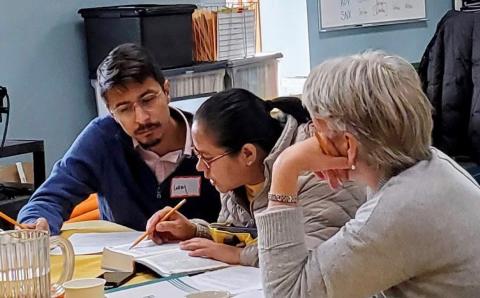In his book Lead: 12 Gospel Principles for Leadership in the Church, Paul David Tripp notes that “one of the most beautiful, hopeful, and encouraging gospel themes that courses its way through Scripture is the theme of fresh starts and new beginnings.”
We are all flawed people. We make mistakes, and we hurt each other by what we say, do, and leave undone. Yet this is only part of the story. God requires that we all—regardless of our background, education, or status in life—repent of our missteps, seek forgiveness and restoration, and begin again. This God-directed process of sanctification continually purifies us as we submit ourselves to him. The more we submit, the more we see God’s work in our lives, changing us and offering us a new start.
Carol Dweck, Ph.D., a professor and researcher from Stanford University and the author of Mindset: The New Psychology of Success, reminds us of a similar truth. Much of the source of stagnation and inequality that we see around us today, she says, is due to a mindset that does not believe in hope. This fixed mindset does not believe in the possibility of growth. It confines us to our present state and prevents us from trying new things.
Yet we know that trying builds us. Moreover, as Christians we are called to be people of hope and restoration—people who expect God to do great things and to change them. We are called to have what Dweck calls a “growth mindset.”
I believe that Dweck has stumbled upon a foundational principle created in us by our Lord: We are to have high expectations of each other. In fact, we are to think of ourselves and each other as God’s image bearers.
This is the highest possible expectation of anyone. If we are an image bearer, then we are to be in a state of continual growth as we encounter our day-to-day realities. In short, we are to have a growth mindset as we experience God’s sanctification and grow to be what God wants us to be.
In this issue of The Banner you will hear from Calvin University and Calvin Theological Seminary about their prison initiative—an initiative to grow God’s people toward him. There is also information from Raise Up Global Ministries about its adult dialogue education programs. These are just a couple of stories of how God uses tools developed by the family that is the Christian Reformed Church in North America to train, to stretch, and to transmit hope into people and places that the world has discarded or deemed hopeless.
I am reminded of my own experience using one of Raise Up’s programs, Timothy Leadership Training, while serving as executive minister of Madison Avenue CRC in Paterson, N.J., several years ago. I was leading a men’s Bible study, and we decided to use TLT to train the group leaders. After three of us came to Grand Rapids and were trained, we returned to New Jersey and developed a strategy for training others. There are numerous stories of what God did with that simple act of obedience.
In some of our sessions, individuals who would ordinarily be viewed as incapable of leadership—people who were formerly incarcerated, formerly drug addicted, or formerly homeless—found themselves learning alongside local pastors, church council members, and other community leaders. We saw the truth of 1 Corinthians 6:11: “And that is what some of you were. But you were washed, you were sanctified, you were justified in the name of the Lord Jesus Christ and by the Spirit of our God.”
Whatever our condition, though we might be viewed as hopeless in the sight of people, when seen through the eyes of God there is hope. May we always remember this truth and continue to have a growth mindset as we allow God to sanctify us day by day.
About the Author
Colin P. Watson Sr. is the executive director of the CRCNA. He is a member of Madison Square Christian Reformed Church in Grand Rapids, Mich.









